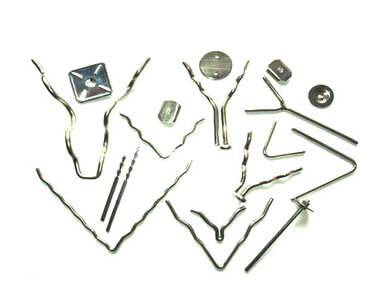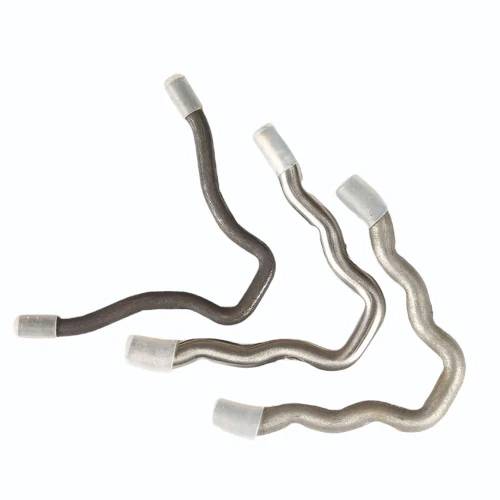Refractory Anchors Products supplier manufacturer and exporter in India
A refractory anchor is an essential component used to secure refractory products inside high-temperature industrial equipment such as furnaces, kilns, boilers, and reactors. These industrial refractory anchors are designed to withstand extreme heat, chemical exposure, and mechanical stress while maintaining the stability of the refractory lining. Typically, the anchors products are formed by die-stamping, wire shaping, or welding, and then threaded or bent into specific designs to meet different application requirements.
Anchors are most commonly installed on vertical walls or ceilings of the refractory structure because these areas carry the heaviest load, and the materials must be strong enough to prevent deformation or failure under high stress. Depending on the application, the cross-section of a refractory anchor may be circular or rectangular—circular anchors are suitable for thinner refractory linings, while rectangular anchors provide greater load support for thicker linings.
Stainless steel refractory anchors, including grades 304, 310, and 316, are widely preferred due to their excellent combination of mechanical strength, corrosion resistance, and cost-effectiveness. High-performance nickel-based alloys such as Inconel, Monel, and Hastelloy are also used in applications requiring extreme heat resistance. Anchor products are available in multiple shapes and sizes, including flat, wire, and Y-shaped designs, each offering specific advantages for load distribution and thermal performance.
Industries such as steel, cement, petrochemical, ceramic, power, and thermal sectors rely on these refractory anchors to ensure long-lasting performance of their refractory linings. The choice of anchor material, shape, and quantity significantly impacts the service life and safety of industrial equipment. Amardeep Steel Centre is a trusted refractory anchors manufacturer, supplier, and exporter, offering a wide range of shapes, sizes, and alloy options to meet diverse industrial requirements.
Varieties of Refractory Anchor Products
We provide different types of anchors products such as stainless steel 304 refractory anchors, stainless steel 310 refractory anchors, stainless steel 316 refractory anchors, and custom designs, depending on your project requirements.
Standard Specification for Refractory Anchor
Refractory anchors are manufactured according to international quality standards to ensure reliability in high-temperature applications. These specifications define their size, length, shape, and material grades.
| Specification | Details |
|---|---|
| Size Range | 3 mm to 16 mm |
| Length | Up to 600 mm (custom available) |
| Material Grade | Stainless Steel 304, 310, 316, 321, Inconel, Alloy Steel |
| Standards | ASTM / ASME / DIN / ISO |
| Forms | V, Y, U, Crook, Zig-Zag, Custom Design |
Chemical Composition of Refractory Anchors
Mechanical properties are important to ensure the anchors can withstand mechanical stress, thermal expansion, and pressure during operation. These properties make them suitable for high-temperature furnaces and industrial kilns.
| Property | Value |
|---|---|
| Tensile Strength | 515 – 620 MPa |
| Yield Strength | 205 – 240 MPa |
| Elongation | 40% min |
| Hardness | 200 HB max |
Mechanical Properties of Refractory Anchors
The mechanical performance of aluminium products varies by grade but generally includes the following ranges:
| Property | Metric Units | English Units |
|---|---|---|
| Yield Strength | 30 – 500 MPa | 4.35 – 72.5 ksi |
| Tensile Strength | 58 – 500 MPa | 8.41 – 79.8 ksi |
| Elongation | 1% – 44% strain | 1% – 44% strain |
| Hardness (Vickers) | 118 – 1,480 MPa | Measured in HV |
| Young’s Modulus | 68 – 82 GPa | 9.86 – 11.9 million psi |
Physical Properties of Refractory Anchors
Physical properties like density, melting point, and thermal conductivity define how well anchors perform under extreme heating and cooling cycles. These values help in selecting the right grade of stainless steel for different industrial applications.
| Property | Value |
|---|---|
| Density | 7.9 g/cm³ |
| Melting Point | 1400 – 1450 °C |
| Thermal Conductivity | 16.2 W/m·K |
| Electrical Resistivity | 0.72 µΩ·m |
| Modulus of Elasticity | 200 GPa |
Equivalent Grades of Refractory Anchors
Equivalent grades make it easier to identify the same material across different international standards (ASTM, UNS, WNR, etc.). This helps industries choose the right product when following global specifications.
| Standard | SS 304 | SS 310 | SS 316 |
|---|---|---|---|
| ASTM | A240 304 | A240 310 | A240 316 |
| UNS | S30400 | S31000 | S31600 |
| WNR | 1.4301 | 1.4841 | 1.4401 |
Applications of Refractory Anchors
Refractory Anchors are widely used in industries where high temperatures and thermal stresses are common. Some major applications include:
- Cement plants
- Steel plants & foundries
- Petrochemical industries
- Thermal power stations
- Kilns, furnaces, and boilers
- Chemical processing units
- Refineries
FAQ’s
1. What are refractory anchors used for?
Refractory Anchors are used to hold refractory linings and insulation in place inside furnaces, kilns, boilers, and other high-temperature equipment.
2. Which material is best for refractory anchors?
Stainless steels like SS 304, SS 310, and SS 316 are most commonly used because of their excellent heat and corrosion resistance.
3. Can refractory anchors be customized?
Yes, we manufacture anchors in various shapes (V, Y, U, Crook) and sizes as per customer requirements.
4. What industries use refractory anchors the most?
Cement, steel, petrochemical, and thermal industries are the major users of refractory anchors.
5. Do you supply anchors internationally?
Yes, we are a global supplier and exporter of refractory anchors, serving clients worldwide.



